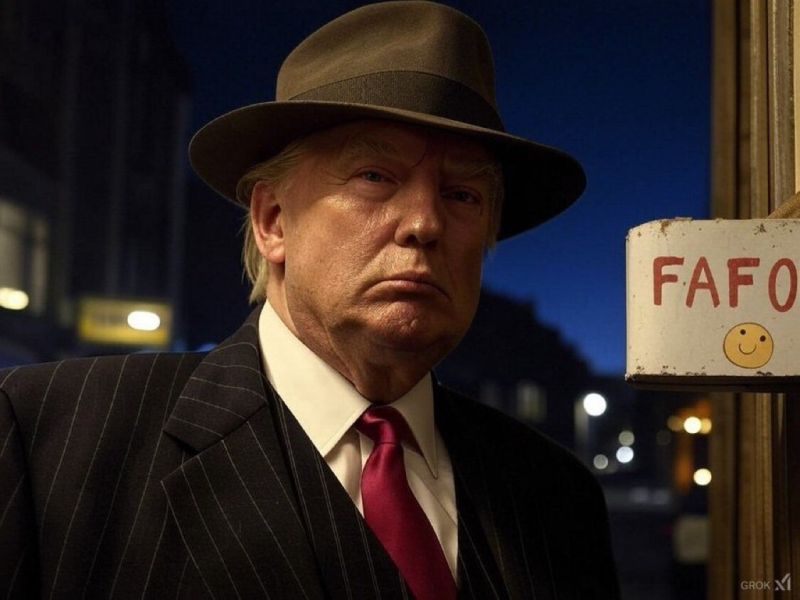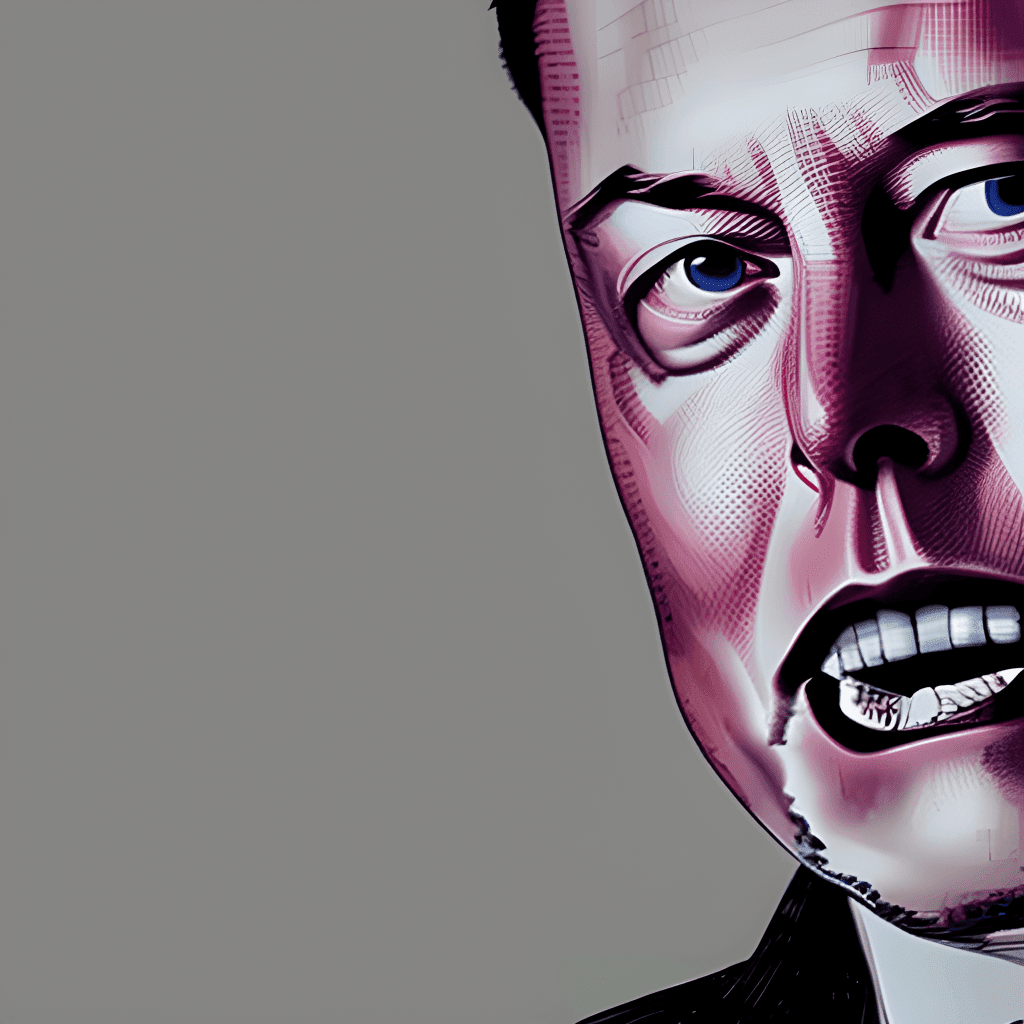The rule of law — where the law applies equally and everyone is subject to it — becomes conflated with its antithesis, which is rule by law — where those in power can arbitrarily create and apply law as they choose, with no accountability.

Above: This is a picture Trump posted on Truth Social over the weekend. FAFO is mob-speak for “Fuck Around, Find Out”. Yes, we’re dealing with someone who sees himself as a Mafia Don. And he’s installing his Capo enforcers in all the agencies and departments of the U.S. government.
3 February 2025 – – For well over the last 25 years, political scientists and political analysts have tried to explain, document, warn about the emergence of a new kind of Mafia rogue state. Not just in the U.S. but across the world.
But their voices have been drowned out in the flood of semi-relevant if not totally irrelevant models of old nation states. This helped sustain the elusive dream that we would return to normality. Fico, Orbán, Putin, Trump. Just abberations.
Nope. Here we are : The Don really is a don. He has always been a don and he will always be a don.
And the horrible reality is that Trump 2.0 is exposing American exceptionalism for what it is – and has always been.
As Guardian columnist Nesrine Malik pointed out this morning, the temptation is to think of Donald Trump as an exogenous shock to U.S. democracy. But look closer, and you will see not a rogue president taking a hammer to a hitherto stable political order – but a history of the erosion of norms that paved the way for him.
American history has a kind of constant drumbeat. Political norms are the scaffolding of democracy, enforced not by the law, but by a sort of social consensus. They are not codified, strict mechanisms for regulating political facts – such as the separation of powers – but the agreement that such things should be respected and observed. We always talk about America’s system of government, as if it is a solid thing, bound by the constitution and institutions the way a belt cinches around the waist.
But as political writer Ezra Klien noted over the weekend:
It’s really just a pile of norms in a trenchcoat. Knock the norms down and everything changes. Trump’s very purpose is to knock them down, but in some ways, he is only accelerating a process that had started years ago.
Take the one example everybody quotes – Trump’s order to construct a migrant detention centre in Guantánamo Bay – a space that has for years operated outside international law despite outcries and appeals for closure. Hundreds of prisoners were kept there under military law, often following rendition, disappearance and torture at CIA black sites. Trump’s proposal to detain tens of thousands of migrants there is an outrageous move, but it is not an aberration. He is building, literally, on what came before him.
Another of Trump’s directives also builds on precedent. One of his executive orders pledges to deport students and others without U.S. citizenship who participate in pro-Palestine protests. But their actions were already condemned and over-policed way before Trump was re-elected. Don’t forget that the Democrats blocked requests for a Palestinian speaker at their convention, and across the country “liberal” academic institutions expelled students for protesting, withheld their degrees, and called in armed police to dismantle their sit-ins.
As Malik points out, the same goes for Trump’s withdrawal from international organizations such as the World Health Organization and his imperial adventurism when it comes to foreign policy. The U.S. has a long record, under much more gentlemanly presidents, of breaking international law, insulting international institutions and embarking on unilateral campaigns licensed by its superpower status. Over two decades ago, Congress passed a law authorising “all means necessary and appropriate” to “free US or allied personnel detained by or on behalf of the International Criminal Court”. It was dubbed the Hague Invasion Act. The “war on terror” was itself one long, disastrous, norm-busting campaign. A week before the US and its allies invaded Iraq, the United Nations secretary general warned them that military action would be a violation of the UN charter.
Even optically, Trump’s alliances with tech billionaires is crude and visible, but it mirrors the billionaires and influencers who flocked to Kamala Harris’s campaign, more of whom publicly backed her than Trump.
And let’s face it: tech billionaires have been running the show for years in America.
Biden continued the practice of previous presidents, Republican and Democrat, of tapping up super-rich donors for ambassadorial positions before Trump made the quid pro quo explicit with his cabinet of billionaires. And even the liberal argument that Trump’s mere temperament, character and disposition is self-disqualifying runs up against the fact of his predecessor. Biden’s stubborn clinging on to power, and people being asked to ignore their very eyes and ears as his capacities faded, proved that contempt for the public’s intelligence is not the preserve of the right.
This is not to suggest that there is no difference between Trump and his predecessors, or that anyone is under any illusion that the U.S. was a *perfect* democracy before his arrival on the scene. I do not mean to minimize Trump’s violations and their material impact, most of all his lack of adherence to a peaceful transition of power – a *super norm*, if you will.
But the American dream of prosperity at home and supremacy abroad has long masked a much more cynical and transactional order – one that Trump is both exposing and entrenching.
America has been moving to rule “by” law for a very, very long time.
And as I have written numerous times, the danger comes from assuming that Trumpism comes out of nowhere. In fact, it comes from many sources, but one of them is his predecessors’ creation of a political system in which serial breaches are seen as acceptable because they are done by the right people. Well, as Malik emphasizes, to millions of people, Trump is the right person.
And, yes. we can certainly say modern communication technology helped make it so. Our antisocial proclivities were once kept in check by more effortful methods of reaching out to one another. Anybody remember the deliberate, reflective practice of composing a handwritten letter? Probably impossible since it has long been superseded by the short, snappy idiom of texting.
By removing barriers to communication, social media has enabled us to let loose our worst instincts and transmit to a huge audience whatever thought comes to mind. As media pundit Nicolas Carr notes in his new book, we have created “a malevolent coxcomb”. It is a topic beyond the scope of this post, so I will just leave it there.
And so what we will see more of going forward is the erasure of America’s famed *system of checks and balances* that allegedly guided the country since its founding. Except they have been disintegrating for years. “Lines will be crossed” in the pursuit of Trump’s agenda. He is moving to eliminate the tools of accountability in government in quick order. There is no resistance, no opposition.
It’s not just that he sees the U.S. government work force as his personal employees who should be loyal servants; he appears ready to suppress any critique or even allow anyone to bear witness to what his administration is really doing. Trump has an unusual gift for evading criticism: the Democrats are just the angry opposition. Republicans who stand up to him are just RINOs. Journalists who expose misconduct are purveyors of fake news. Government officials who warn of his actions are part of the “deep state”.
Judges, prosecutors and inspectors general — all parts of the government that he now hopes to circumvent, remove or bend to his wishes. This is the steamrolling of all official scrutiny. He is marginalizing anyone in a position to question his actions.
It seems obvious that Trump is running the basic play we’ve seen before from Musk and other Silicon Valley billionaires – move fast, break things (with “things” very much including the law), and then dare folks to try and do something about it. Their expectation is that people will be too overwhelmed, and the law will move too slowly, to stop them from doing what they’re doing. Maybe at some later point some lawsuit will provide somebody some relief.
But Trump will fight those challenges at every step through whatever means necessary, many challenges will fail for odd legal reasons, and other challengers will get exhausted by the process. To the extent they ultimately lose some lawsuit, I expect that Trump thinks it won’t reverse what they’re doing; it will just represent a reasonable cost of doing business.

And Elon?
Last week Billionaire Elon Musk’s team took control of the Treasury’s payment system, thus essentially gaining access to the checkbook with which the United States handles about $6 trillion annually and to all the financial information of Americans and American businesses with it. Apparently, it did not stop there.
The Associated Press reported that yesterday two top security officials from the U.S. Agency for International Development (USAID) tried to stop people associated with Musk’s Department of Government Efficiency, or DOGE, from accessing classified information they did not have security clearance to see. The Trump administration put the officials on leave, and the DOGE team gained access to the information.
Vittoria Elliott of Wired magazine has identified those associated with Musk’s takeover as six “engineers who are barely out of – and in at least one case, purportedly still in – college.” They are connected either to Musk or to his long-time associate Peter Thiel, who backed J.D. Vance’s Senate run eighteen months before he became Trump’s vice presidential running mate. Their names are Akash Bobba, Edward Coristine, Luke Farritor, Gautier Cole Killian, Gavin Kliger, and Ethan Shaotran, and they have little to no experience in government.
Public policy expert Dan Moynihan told reporter Elliott that the fact these people “are not really public officials” makes it hard for Congress to intervene. “So this feels like a hostile takeover of the machinery of governments by the richest man in the world,” he said. Law professor Nick Bednar noted that “it is very unlikely” that the engineers “have the expertise to understand either the law or the administration needs that surround these agencies.”
After Musk’s team breached the USAID computers, cybersecurity specialist Matthew Garrett posted: “Random computers being plugged into federal networks is obviously terrifying in terms of what data they’re deliberately accessing, but it’s also terrifying because it implies controls are being disabled—unmanaged systems should never have access to this data. Who else has access to those systems?”
USAID receives foreign policy guidance from the State Department. Intelligence agencies must now assume U.S. intelligence systems are insecure.
Musk’s response was to post: “USAID is a criminal organization. Time for it to die.” Also last night, according to Sam Stein of The Bulwark, “the majority of staff in the legislative and public affairs bureau lost access to their emails, implying they’ve been put on admin leave although this was never communicated to them.”
Congress established USAID in 1961 to bring together the many different programs that were administering foreign aid. Focusing on long-term socioeconomic development, USAID has a budget of more than $50 billion, less than 1% of the U.S. annual budget. It is one of the largest aid agencies in the world.
Musk is unelected, and it appears that DOGE has no legal authority. As political scientist Seth Masket put it:
“Elon Musk is not a federal employee, nor has he been appointed by the President nor approved by the Senate to have any leadership role in government. The ‘Department of Government Efficiency,’ announced by Trump in a January 20th executive order, is not truly any sort of government department or agency, and even the executive order uses quotes in the title. It’s perfectly fine to have a marketing gimmick like this, but DOGE does not have power over established government agencies, and Musk has no role in government. It does not matter that he is an ally of the President. Musk is a private citizen taking control of established government offices. That is not efficiency; that is a coup.”
DOGE has simply taken over government systems. Musk, using President Donald Trump’s name, is personally deciding what he thinks should be cut from the U.S. government.
And trade wars? Trump slapped tariffs of 25% on goods coming from Mexico and Canada, and 10% on goods coming from China.
Oh, yes, you might ask about Trump saying for months he’d hit China with a 100% tariff. Except that Elon gets most of his car parts from China and that would hurt him. While U.S. car manufacturers get many of their parts from Canada. So better to hurt them 😈

If legal remedies aren’t likely to stop Trump and Musk from doing what they’re trying to do, why even talk about the unlawfulness of their actions? It can almost seem naive to do so. Yeah, they’re violating the law. So what? Who’s going to stop them?
If the point of showing how Trump and Musk are violating the law were to make a prediction that they won’t get away with it, I’d be sympathetic to this critique. And, to be sure, there were plenty of commentators during the first Trump Administration who seemed to think that, once it was clear Trump had violated the law, the legal system would bring him down. The expectation held by many that Robert Mueller would ride in on his white horse and save us from Trump was exemplary here.
But I don’t think that’s the point of showing how Trump and Musk are violating the law – or at least that’s not my point when I argue that they’re doing so. Even recognizing the very significant barriers to effective enforcement of the law – and the core point that any effort to end the Trump Administration must ultimately be a political one – I think there are very good reasons to talk about the illegality of what Trump and Musk are doing.
Here are some quick thoughts on that point. I expect I’ll be returning to this issue a lot over the next few years, alas.
For one thing, these issues aren’t mere technicalities. “Impoundment” sounds like it’s something only lawyers would care about, but what we’re really talking about is this: our democratic system, acting in the best way it can, decided to spend money on certain things.
Members of the U.S. Congress, accountable to people in their districts across the country, voted for this funding. And the president signed the funding into law.
Now a new president comes along and decides he doesn’t like what Congress voted for. Under American constitutional democracy, it’s his job to go back to Congress and convince them to pass a new law eliminating that funding. If he doesn’t want to do that – and, worse, if he wants to just delegate to some outside billionaire the decision of which of Congress’s spending laws to follow – that’s a fundamental democratic problem.
That’s why it violates Congress’s constitutional power of the purse, as well as the Impoundment Control Act – a statute Congress adopted to underscore its constitutional power in the face of President Nixon’s efforts to eviscerate it.
Talking about the law in this context – and talking about how we got to the law we have – calls attention to the ways in which Trump and Musk’s actions contravene basic principles of our republican constitutional system.
Discussing these matters in legal and constitutional terms provides an important tool for legislators who want to call attention in the press to the depredations of the new regime, and doing so can be one of many mobilizing tools for the citizenry. Not to mention that the widespread agreement by legal experts that the Trump Administration is massively violating the law will make it more likely that courts and other legal actors will step in to provide some checks–however limited those checks might be.
Finally, it’s important to note that the legal process itself can provide tools of accountability that can advance the political debate over Trump’s actions, even if the courts ultimately do not stop those actions. For example, public information remains very murky regarding what exactly Musk is doing with the payments system, federal personnel records, and other data systems to which he and his team have access. We don’t know who on his team has access, or what limitations have been placed on that access.
The ongoing litigation against the Trump impoundments provides a prime opportunity to obtain, and make public, information about these questions. Under the Federal Rules of Civil Procedure, an injunction binds not only the named parties but those “in active concert” with those parties. Given the substantial indications that Musk’s team intends to use its access to the payment system to impound funds, the plaintiffs can use the litigation to obtain information about just what Musk et al. are doing, who is involved, what are the limitations on their access to federal databases, and whether they in fact have been granted the tools to stop payments. That information might feed further rounds of litigation, but it would also be useful to public debate. Providing information to the public is often one of the benefits of litigation, and it’s one way that the law can advance the democratic checks on the second Trump Administration.
I’ve been a lawyer for over 40 years. I am as skeptical as anyone is about the U.S. courts. I know the law won’t “save us” from Trump. We’re going to have to save ourselves. It’s going to be a long road.